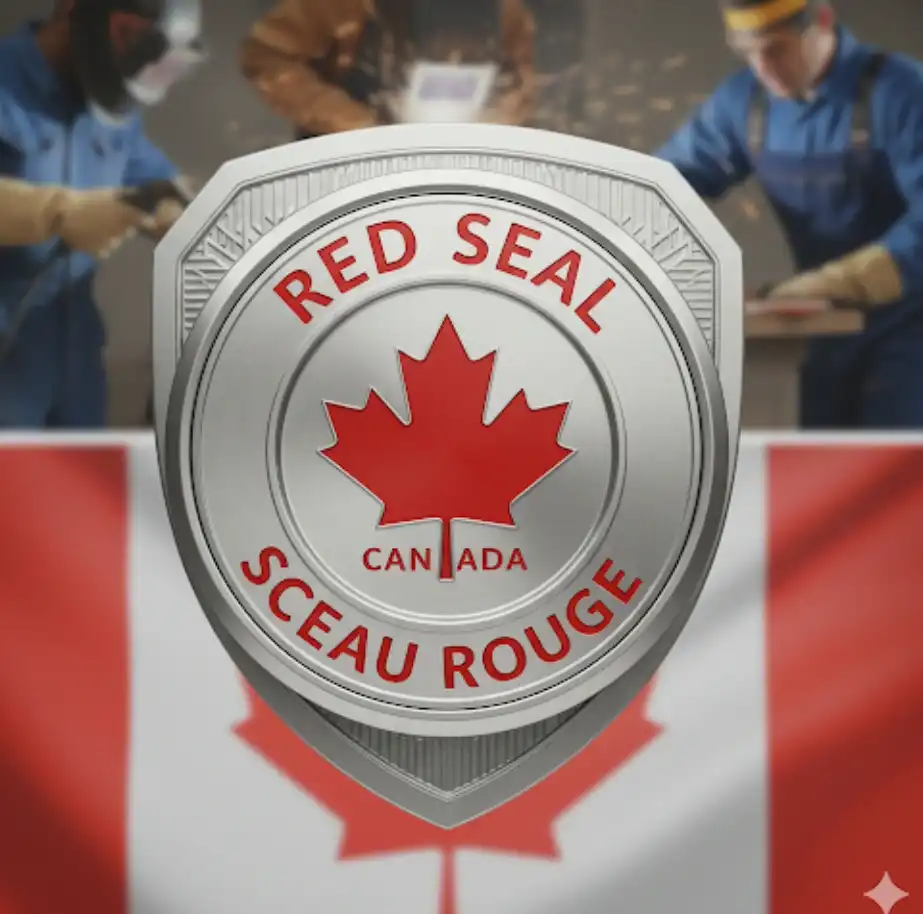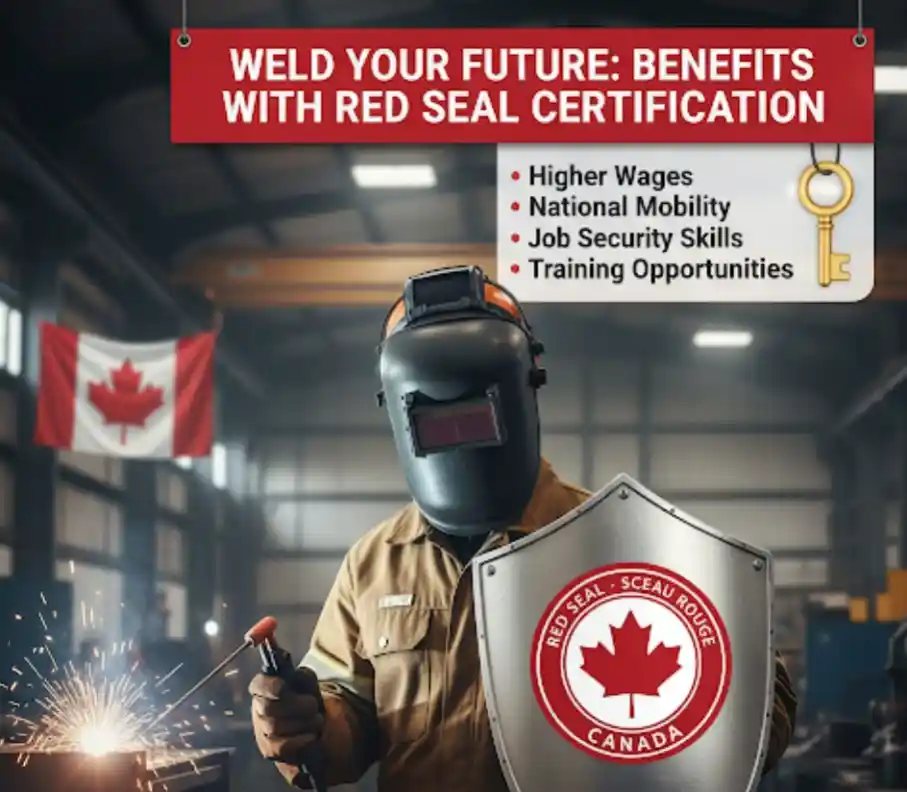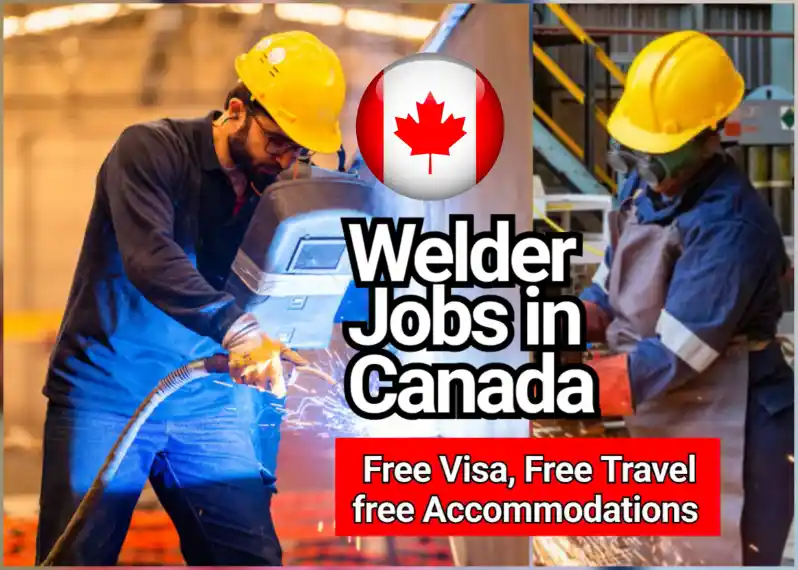Canada is one of the top countries where foreign workers are moving to build a better life. Every year, thousands of skilled and unskilled workers enter the country because Canada does not have enough people to fill important jobs.
Welding is one of those jobs. Welders are in high demand across different provinces because of Canada’s large industries like oil and gas, shipbuilding, railways, and construction. Many Canadian employers are open to hiring workers from outside the country and are ready to sponsor visas for qualified welders.
For Nigerians who have welding experience, this is a great chance to work abroad, earn good money, and even apply for permanent residency after some years. In this guide, we will explain everything you need to know about welder jobs in Canada with visa sponsorship — from job types, salaries, requirements, to how you can apply successfully.
Why welders are wanted in Canada
Canada has many big factories, shipyards, oil and gas sites, and construction projects. These places always need skilled welders. Sometimes there are not enough Canadian workers for all the jobs. So companies look for skilled people from other countries — including Nigeria. This means opportunities for welders who can show skills and good work experience. The Federal Job Bank and big job sites show hundreds of welder vacancies across Canada.
Types of welding jobs you can find in Canada
- Shop/Maintenance Welder — repair and make parts in a factory.
- Structural Welder — weld building parts: beams, frames.
- Pipe Welder — weld pipes for oil, gas, water. This often pays more.
- Fabricator / Welder-Fabricator — cut, bend, and weld metal pieces into assemblies.
- TIG/MIG Specialist — high-precision welding for metal types like stainless steel or aluminium.
- Underwater Welder — special job, paid high but needs extra training and risk tolerance.
Many employers will list “Red Seal” or trade certification as an advantage (see certifications below).


Salary For Welders in Canada
Welder Job Salary in Canada depends on where you live, the company you are working in and the level of experience of the foreign workers. Below are real payment ranges from Government and job sites:
- Normal payment per hour: is about CAD $21.00 to CAD $44.50 per hour (low–high depending on province). Median around CAD $29/hour. (Job Bank wages report).
- Average/typical hourly pay reported on some job sites is around CAD $29–31 per hour (varies by source).
Remember: big projects (oil, shipbuilding, remote northern work) and specialized welding (pipe welding, pressure vessels) pay more.
| Job Title | Typical Salary Range (CAD) |
|---|---|
| Entry-level Welder / Helper | $21.00 – $28.00 per hour |
| Shop Welder / Fabricator | $24.00 – $34.00 per hour |
| Structural Welder | $25.00 – $38.00 per hour |
| Pipe Welder / Industrial Pipefitter | $30.00 – $44.00+ per hour |
| TIG / MIG Specialist | $28.00 – $40.00 per hour |
| Welding Supervisor / Lead | $35.00 – $50.00 per hour |
| Underwater Welder (specialized) | $40.00 – $80.00+ per hour (highly variable) |
What Employers Expect (Skills & Documents)
Before you apply for welding work in Canada, be sure that you already hav all this things available so that you can get it fast, these are what employers always want to get from you;-
- Trade Certificate Or Proof Of Skill — e.g., apprenticeship certificate, trade school diploma, or a Red Seal endorsement (if you have it).
- Experience — employers prefer 1–4+ years depending on level. For specialized welding (pressure vessels, pipe welding) they want more.
- Safety Training — e.g., WHMIS, confined space, working at heights, basic first aid.
- Good English — enough to follow instructions and safety rules.
- Resume (CV) and references — clear listing of projects, types of welding (MIG/TIG/Stick/Flux-cored), materials welded (steel, stainless, aluminium).
Many employers will also require certifications or test welds when you arrive
Certifications That Can Give You Job Faster
- Red Seal Endorsement (if you can obtain it) — this is Canada’s national trade standard for many trades and is valued by employers.
- Welding certifications (e.g., CSA, ASME, API for pipe/pressure-vessel work) — for certain industrial jobs you need specific code certifications.
- Trade Apprenticeship Certificate / Journeyman Certificate — shows you completed formal training.
If you do not have Red Seal, you can still get jobs, but employers may prefer those who already hold trade recognition
How Visa Sponsorship Works — (easy steps to follow)
There are several ways employers help foreign welders come to Canada. Important legal terms: LMIA, work permit, PNP, Express Entry.
A. Employer gets an LMIA and hires you (common route)
- Employer advertises job and shows they can’t find a Canadian worker.
- Employer applies for a Labour Market Impact Assessment (LMIA). A positive LMIA says they can hire a foreign worker.
- With LMIA and job offer, you apply for an employer-specific work permit from IRCC.
B. Provincial Nominee Program (PNP)
Some provinces have streams for trades and will accept skilled welders. If a province nominates you, it helps your path to permanent residence. Many PNP streams require a job offer from a local employer.
C. Express Entry (Federal Skilled Trades / Category draws)
Welders may be eligible for Express Entry under the Federal Skilled Trades Program or under trade-targeted draws. A qualifying job offer or provincial nomination makes the process faster.
D. LMIA-exempt routes
Some work permits are LMIA-exempt (special programs, inter-company transfers, or employer using Employer Portal to give an offer number). For typical welding jobs, LMIA route remains common. Always check IRCC rules.
How To Get A Sponsored Job And Work Permit (step by step)
- Prepare your CV and certificates — list types of welding, years of experience, trade certificates, and referees from past employers. Translate documents to English if needed.
- Search and apply for jobs — use Canadian job sites like www.ca.indeed.com . Apply directly and be honest about your location. Many employers list “LMIA available” or “visa sponsorship available” in here. Indeed+1
- Interview and test weld — employers may ask for a skills test or video of your welding work.
- Get a job offer — if the employer wants you, they may apply for an LMIA. Ensure they explain who pays LMIA fees (the employer must not force you to pay for LMIA).
- Apply for work permit — with LMIA or job offer number, apply to IRCC for a work permit. Follow IRCC instructions carefully and pay necessary fees according by Government of Canada
- Travel and start work — after approval, travel to Canada and start work according to your permit conditions.
Where To Look For Welding Jobs in Canada
- Job Bank (Canada’s official job board) — many employer posts and LMIA notices. Good for government-related postings. Job Bank
- Indeed Canada — many “LMIA / visa sponsorship” welding roles appear here. Employers often add “LMIA” or “visa sponsorship” in the job title. Indeed+1
- ZipRecruiter, Jooble, LinkedIn, Monster — check these too. ZipRecruiter shows pay ranges and many posted openings. ZipRecruiter+1
- Company websites — big employers (construction firms, shipyards, oil companies, rail, pipelines). Apply directly when possible.
- Niche welding job boards — sites like WeldingJobs.com or JobsInWelding can also help. Betterteam
Tip For Quick Employment: Apply every day, tailor your CV to each job, and explain your willingness to travel and ability to do test welds. Employers see many applicants — make yours stand out.
How Much Money it Cost to Move to Canada
Moving to Canada needs money for, so since you are looking for welding job under sponsorship, your employer/sponsor is the one that that would pay all this financial requirements, but it’s still okay for you to know the details:-
- Visa and work permit fees (IRCC fees + biometrics).
- Travel (flight).
- First months’ living cost (rent, food, transport). Cost varies by province — larger cities are more expensive.
- If your employer requires any training, exam, or certification in Canada, plan for that cost too.
Exact fees change over time — check IRCC official pages for current fees before applying.
Tips for Applicants
- Show real experience. Employers want proof: photos, videos, or references from previous jobs.
- Get any local trade certificates you can. Even Nigerian trade certificates show commitment. If you can do short courses in TIG/MIG, do them.
- Learn English well for safety talk. Good communication saves lives on job sites.
- Beware of scammers. Never pay someone promising guaranteed visa. Employers and official processes require fees.
- Use LinkedIn and network. Join welding and construction groups; sometimes employers contact people through LinkedIn.
- Be flexible on location. Some provinces like Alberta, Saskatchewan, and British Columbia often have many welding jobs and pay better in certain industries.
Common Mistakes To Avoid
- Sending a one-line message with no CV or certificates.
- Paying private agents a huge fee for “guaranteed sponsorship” — this is risky.
- Accepting a job with vague terms and no written contract.
- Not preparing for a skills test — many employers ask for a test weld or video.
Timeframe it Will Take for Job Employing/Visa Process
- Job search & interview: 1–3 months (depends on how much you apply).
- Employer applies for LMIA: 1–3 months (processing time varies).
- Work permit processing (you): weeks to months depending on country and documents.
- Travel and start work: once permit is approved, you can travel.
NOTE: Times can change a lot — always check IRCC processing times for your country.
Trusted Links To Job Sites
(use these to search and apply) if you are a foreign job seeker looking for Welder Jobs in Canada… below are real, helpful Canadian job sites. Click or copy-paste into your browser.)
- Job Bank Canada official website — www.jobbank.gc.ca
- In deed — https://ca.indeed.com
- Zip Recruit — www.ziprecruiter.com
- General Job Board — www.monster.ca
Final Tips And Encouragement
- Start small and build. Get a good CV and begin applying right away — check Job Bank and Indeed every day.
- Be honest and prepare for tests. Employers prefer reliable welders who can pass on-site weld tests.
- Use caution with agents; prefer direct employer contact or recognized immigration consultants (if you must use one, check credentials).
- Keep learning: a short extra course in TIG, pressure welding, or code welding.
Conclusion
Welding is a strong trade in Canada. For international immigrants with real welding skills, experience, and good preparation, Canada offers real job opportunities and a path to permanent residence.
The common route is to get a job offer from a Canadian employer who applies for an LMIA or uses a provincial program to nominate you. Pay is generally good compared to Nigeria and can be higher for specialized welders or in certain provinces. Use official sources (Job Bank, IRCC) and trusted job boards. Apply widely, prepare your documents, and be careful of scams.
Helpful government and job boards to start with: Job Bank, Indeed, ZipRecruiter, LinkedIn, and niche welding boards (links above). Good luck — work hard, prepare well, and keep applying!
Frequently Asked Questions (FAQs)
Q1: Do most Canadian employers pay for visa fees?
A: Employers sometimes pay LMIA-related costs or cover relocation, but it depends. Many will help with LMIA and give a job offer; not every employer pays travel or all fees. Always clarify before you accept.
Q2: Do I need Red Seal to get a job?
A: No — not always. Red Seal helps a lot and gives advantage, but many employers hire experienced welders without Red Seal if they can prove skills. Getting Canadian certification later is an option.
Q3: Can I apply from Nigeria or must I be in Canada?
A: You can apply from Nigeria. Many employers hire foreign workers and get LMIA so you can apply for a work permit from abroad. Some roles may require in-Canada hiring, but most sponsor from outside.
Q4: How long before I can get PR?
A: There is no fixed time. If you get a provincial nomination or qualify under Express Entry, you could move from temporary worker to PR in months or a few years depending on your stream and score. Each case is different.
Q5: Which provinces pay the most?
A: Provinces with oil, mining, and heavy industry (e.g., Alberta, Saskatchewan, parts of BC, and Newfoundland) often pay higher wages for welders. Check provincial wage reports for details.
